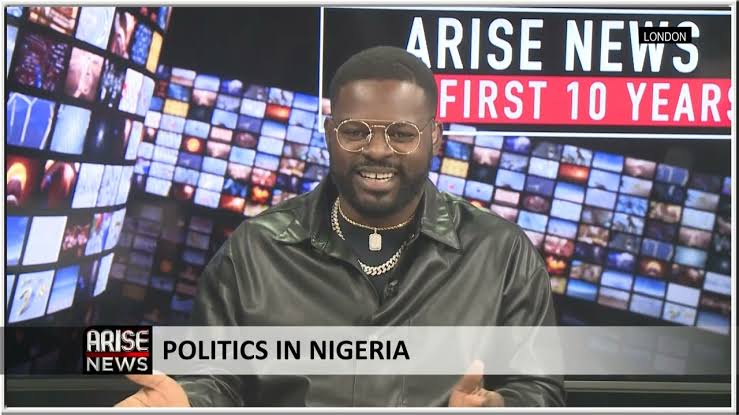Renowned Nigerian rapper, songwriter and activist Folarin Falana, popularly known as Falz, has ignited a firestorm of debate with his recent assertion that Nigeria has “moved backwards” under the presidency of Bola Ahmed Tinubu. The statement, reported by ARISEtv in a June 4, 2025, post on X, encapsulates a growing sentiment of frustration among some Nigerians grappling with economic hardship and socio-political challenges two years into Tinubu’s administration. However, the claim has also sparked counterarguments, with defenders of the president arguing that his reforms, while painful, are necessary for long-term stability.
The Context of Falz’s Critique
Falz, known for his socially conscious music and outspoken activism, has long been a voice for Nigeria’s youth, addressing issues like governance, corruption and economic inequality. His latest comments reflect a broader wave of discontent expressed on platforms like X, where Nigerians have voiced concerns over rising inflation, a weakened Naira, and deteriorating living standards. Posts on X highlight specific grievances, including Nigeria’s reported rise to 6th on the Global Terrorism Index, its label as the “poverty capital of the world,” and a national debt reportedly ballooning to N200 trillion by March 2025. These figures, while widely circulated, often lack verified primary sources, making it critical to approach them with caution.
Falz’s assertion that Nigeria has regressed under Tinubu points to two flagship policies: the removal of the fuel subsidy and the unification of foreign exchange rates. Introduced shortly after Tinubu’s inauguration in May 2023, these reforms were touted as bold steps to address long-standing fiscal inefficiencies. The fuel subsidy, which cost the government billions annually, was seen as unsustainable, while the exchange rate unification aimed to create a market-driven currency system. However, the immediate aftermath of these policies has been turbulent, with fuel prices soaring, transportation costs spiking, and inflation reaching record highs. For many Nigerians, these changes have translated into a cost-of-living crisis, with basic goods and services becoming increasingly unaffordable.
The Economic Landscape
The removal of the fuel subsidy in June 2023 led to an immediate tripling of fuel prices, with pump prices rising from approximately N200 to over N600 per liter in many regions. This, coupled with the Naira’s devaluation following the exchange rate unification, has driven inflation to levels not seen in decades. Inflation has pushed millions into poverty with Nigeria retaining its unenviable title as the global poverty capital. The Naira’s value has plummeted, trading at over N1,500 to the dollar in some markets by mid-2025, compared to around N700 in early 2023. This has made imports on which Nigeria heavily relies—prohibitively expensive, further squeezing households and businesses.
Critics like Falz argue that these policies have exacerbated inequality and eroded purchasing power, particularly for Nigeria’s youth and working class. Small businesses, which form the backbone of the economy, have struggled with higher operational costs, while wage earners face stagnant salaries in the face of skyrocketing prices. The ripple effects are evident in daily life: commuters face higher transport fares, food prices have surged, and power outages persist despite increased electricity tariffs. These challenges have fueled protests and strikes, with labor unions like the Nigeria Labour Congress (NLC) clashing with the government over demands for wage hikes and policy reversals.
Yet, defenders of Tinubu’s administration argue that these reforms, while painful, are necessary to correct decades of economic mismanagement. The fuel subsidy, they contend, disproportionately benefited the wealthy and smugglers, draining resources that could have been invested in infrastructure, healthcare, or education. The exchange rate unification, meanwhile, aims to attract foreign investment and stabilize the economy in the long term. Government officials have pointed to initiatives like the Compressed Natural Gas (CNG) program, designed to provide cheaper fuel alternatives, and investments in agriculture to boost food security as evidence of forward-thinking policies. However, these measures have yet to yield tangible relief for most Nigerians, leading to skepticism about their efficacy.
Beyond Economics: Security and Debt Concerns
Falz’s critique also aligns with concerns about Nigeria’s security and fiscal health. Nigeria’s rise to 6th on the Global Terrorism Index, a claim that underscores ongoing challenges with insurgency, banditry, and communal violence. The Boko Haram insurgency in the Northeast, banditry in the Northwest, and separatist agitations in the Southeast continue to strain security forces. While Tinubu’s administration has prioritized military modernization and regional cooperation to combat terrorism, critics argue that insecurity remains a significant barrier to economic progress and foreign investment.
The reported N200 trillion national debt has also become a lightning rod for criticism. Nigeria’s debt profile, which includes both domestic and external borrowing, has grown significantly in recent years, driven by budget deficits and infrastructure projects. While borrowing is not inherently problematic, the lack of transparency and concerns about debt sustainability have raised alarm. Critics question whether loans are being effectively utilized, pointing to stalled projects and allegations of mismanagement. Supporters, however, argue that infrastructure investments—such as road networks, rail lines, and power projects—are critical for long-term growth and that debt levels must be viewed in the context of Nigeria’s GDP and revenue potential.
A Polarized Debate: Progress or Regression?
Falz’s assertion that Nigeria has “moved backwards” is not without nuance. In his ARISEtv interview, he acknowledged that Tinubu still has two years left in his term, suggesting that it may be premature to write off his presidency entirely. This caveat reflects the complexity of assessing a government’s performance midway through its tenure. Economic reforms often entail short-term pain for long-term gain, and Nigeria’s challenges—poverty, insecurity, and corruption—are deeply entrenched, predating Tinubu’s administration.
On one hand, critics argue that the government has failed to cushion the impact of its reforms on vulnerable populations. Social safety nets, such as cash transfer programs, have been criticized as inadequate or poorly implemented. The youth, who form a significant portion of Nigeria’s population, feel particularly disillusioned, with unemployment rates hovering around 33% according to pre-2025 estimates. Falz, as a prominent youth advocate, channels this frustration, echoing sentiments shared in hashtags like #EndBadGovernance and #TinubuMustGo trending on X.
On the other hand, Tinubu’s supporters highlight incremental progress that often goes underreported. Efforts to diversify the economy away from oil dependency, such as investments in agriculture and technology, are gaining traction. The Lagos-Calabar Coastal Highway project, for instance, is touted as a potential economic game-changer, though it remains under construction. The government’s push for digital innovation, including support for fintech startups and the creative industry, aligns with the aspirations of Nigeria’s tech-savvy youth. Moreover, Nigeria’s GDP growth, while modest, has remained positive, with the IMF projecting 3.1% growth for 2025, suggesting some resilience amid global economic headwinds.
The Bigger Picture
Falz’s critique, while rooted in real grievances, risks oversimplifying Nigeria’s challenges. Economic indicators like inflation and debt are influenced by global factors—such as rising energy prices and supply chain disruptions—beyond any single administration’s control. Similarly, security and poverty issues are structural, requiring decades of consistent policy to address. The polarized discourse on X, where users either vilify or defend Tinubu, underscores the need for a more balanced assessment. Verifiable data, such as reports from the National Bureau of Statistics or international bodies like the World Bank, would provide a clearer picture, but such sources are often absent from social media narratives.
As Nigeria navigates this pivotal moment, the voices of figures like Falz play a crucial role in holding leaders accountable and amplifying public concerns. Yet, the path forward requires constructive dialogue, not just criticism. Tinubu’s administration must address immediate hardships—through targeted subsidies, wage adjustments, or transparent communication—while staying the course on reforms that could yield long-term benefits. For Nigerians, the question remains: is the pain of today a necessary step toward a brighter future, or a sign of deeper regression? Only time will tell, but the debate sparked by Falz ensures that the nation’s pulse remains firmly in the spotlight.
Join our Whatsapp channel to stay updated always!




